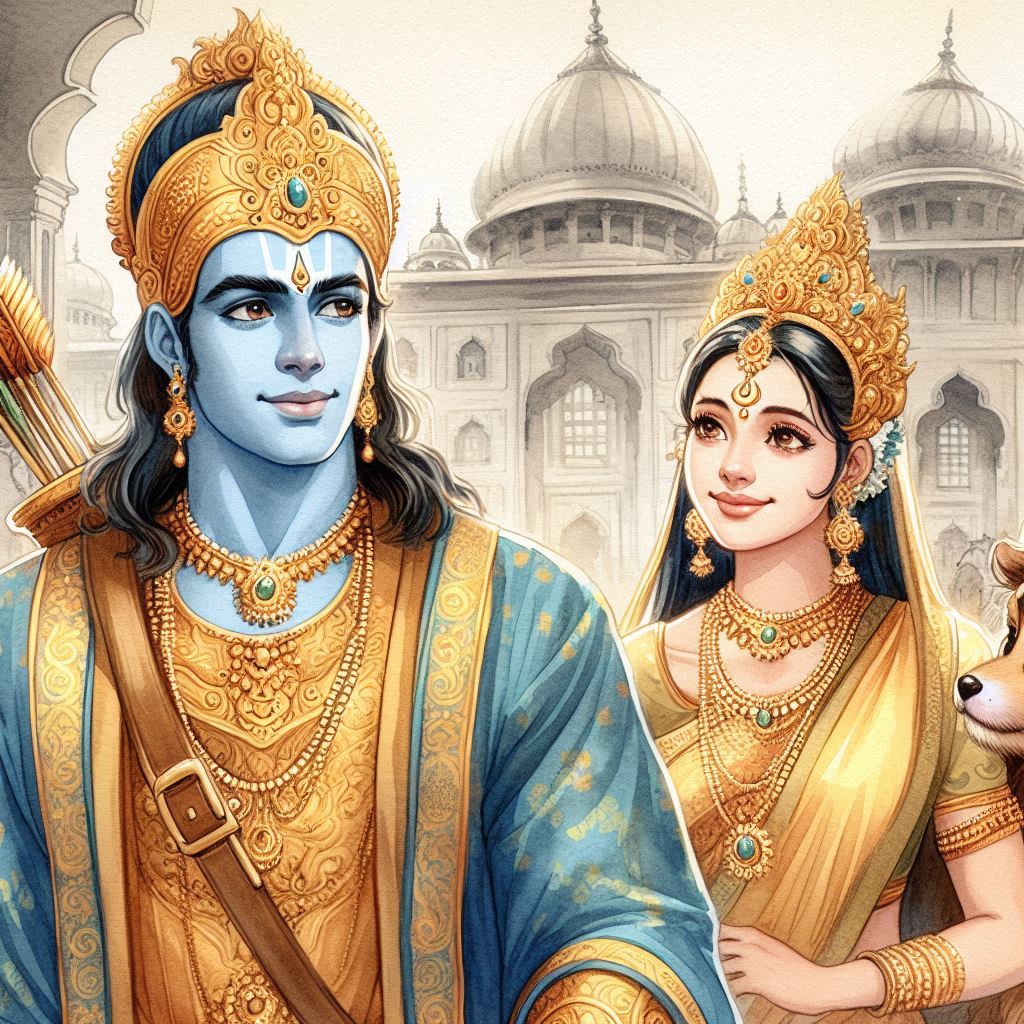kana kana rucirA
Sahityam
Pallavi
kana kana rucirA
kanaka-vasana, ninnu (kana)
Show Word Meanings
kanaka-vasana, ninnu (kana)
The more I behold you, the sweeter it becomes,
O Golden-robed one!
O Golden-robed one!
Anupallavi
dina-dinamunu manasuna canuvuna ninnu (kana)
Show Word Meanings
Day after day, with love in my heart, (the more I behold…)
Charanams
pAlu-gAru mOmuna zrIyapAra
mahima tanaru ninnu (kana)
Show Word Meanings
mahima tanaru ninnu (kana)
That charming face, radiant with auspiciousness
And boundless glory, (the more I behold…)
And boundless glory, (the more I behold…)
kalakalamanu mukha-kaLa galigina sIta
kulukucunOra kannulanu jUcu ninnu (kana)
Show Word Meanings
kulukucunOra kannulanu jUcu ninnu (kana)
Whom Sita, with her radiant, cheerful glow,
Graces with elegant side-glances, (the more I behold…)
Graces with elegant side-glances, (the more I behold…)
bAlArkAbha sucEla maNi-maya-
mAlAlaGkRta kandhara
sarasijAkSa vara-kapOla surucira-
kirITa-dhara santatambu manasAraga (kana)
Show Word Meanings
mAlAlaGkRta kandhara
sarasijAkSa vara-kapOla surucira-
kirITa-dhara santatambu manasAraga (kana)
Lord as radiant as the rising Sun, clad in fine garments!
Whose neck is adorned with a gem-studded necklace,
O Lotus-eyed One, with cheeks that gleam,
Crowned in brilliance! Unceasingly, to my heart’s delight,
The more I behold You…
Whose neck is adorned with a gem-studded necklace,
O Lotus-eyed One, with cheeks that gleam,
Crowned in brilliance! Unceasingly, to my heart’s delight,
The more I behold You…
sApatni mAtayau surucicE
karNa zUlamaina mATa vInula
curukkana tALaka zrI harini
dhyAniJci sukhimpaga lEdAyaTu (kana)
Show Word Meanings
karNa zUlamaina mATa vInula
curukkana tALaka zrI harini
dhyAniJci sukhimpaga lEdAyaTu (kana)
Unable to endure the harsh words of his stepmother Suruchi,
Which pierced his ears like spikes,
Did not Dhruva find solace in meditating on Sri Hari?
In the same way, the more I behold You…
Which pierced his ears like spikes,
Did not Dhruva find solace in meditating on Sri Hari?
In the same way, the more I behold You…
mRga-mada lalAma zubha niTala¹
vara jaTAyu mOkSa phalada
pavamAna sutuDu² nIdu mahima delpa
sIta telisi³ valaci sokka lEdA A rIti ninnu (kana)
Show Word Meanings
vara jaTAyu mOkSa phalada
pavamAna sutuDu² nIdu mahima delpa
sIta telisi³ valaci sokka lEdA A rIti ninnu (kana)
O Lord, whose noble forehead bears a mark of musk!
Bestower of liberation upon the blessed Jatayu!
Did not Sita, enraptured with love,
Rejoice as Hanuman spoke of Your glory?
In the same way, the more I behold You…
Bestower of liberation upon the blessed Jatayu!
Did not Sita, enraptured with love,
Rejoice as Hanuman spoke of Your glory?
In the same way, the more I behold You…
sukhAspada vimukhAmbu-dhara-pavana
vidEha-mAnasa-viharApta-
surabhUja mAnita-guNAGka
cidAnanda khaga-turaGga
dhRta-rathAGga⁴ parama-dayAkara
karuNA-rasa-varuNAlaya
bhayApahara zrI raghupatE (kana)
Show Word Meanings
vidEha-mAnasa-viharApta-
surabhUja mAnita-guNAGka
cidAnanda khaga-turaGga
dhRta-rathAGga⁴ parama-dayAkara
karuNA-rasa-varuNAlaya
bhayApahara zrI raghupatE (kana)
O Abode of bliss! O mighty gale that scatters the clouds of foes!
Dweller in the hearts of the celestials!
O Wish-tree fulfilling the desires of your beloved ones!
Bearer of virtue’s mark, radiant with intellect and bliss!
Swift rider of Garuda, wielder of the mighty discus!
O Supreme fountain of compassion! Ocean of its nectar!
Destroyer of fear, Lord of the Raghus!
Dweller in the hearts of the celestials!
O Wish-tree fulfilling the desires of your beloved ones!
Bearer of virtue’s mark, radiant with intellect and bliss!
Swift rider of Garuda, wielder of the mighty discus!
O Supreme fountain of compassion! Ocean of its nectar!
Destroyer of fear, Lord of the Raghus!
kAmiJci prEma-mIra karamula
nIdu pAda-kamalamula baTTukonu
vADu sAkSi rAmanAma-rasikuDu
kailAsa-sadanuDu sAkSi
Show Word Meanings
nIdu pAda-kamalamula baTTukonu
vADu sAkSi rAmanAma-rasikuDu
kailAsa-sadanuDu sAkSi
The one who, with overflowing love,
Holds Your lotus feet in his hands as he desires—[Hanuman]
He stands as a witness to my words.
[Shiva], the resident of Kailasa,
The enjoyer of Rama’s name, bears witness too.
Holds Your lotus feet in his hands as he desires—[Hanuman]
He stands as a witness to my words.
[Shiva], the resident of Kailasa,
The enjoyer of Rama’s name, bears witness too.
mariyu nArada parAzara zuka zaunaka
purandara nagajA dharaja
mukhyulu sAkSi gAda sundarEza
sukha kalazAmbudhi-vAsAzritulakE (kana)
Show Word Meanings
purandara nagajA dharaja
mukhyulu sAkSi gAda sundarEza
sukha kalazAmbudhi-vAsAzritulakE (kana)
Furthermore, exalted ones like sages Narada, Parasara, Suka, and Saunaka,
Indra, Parvati, and Sita—all stand as witnesses, do they not?
O pinnacle of beauty! One joyously dwelling in the Ocean of Milk!
For those who have sought refuge in You,
The more they behold You…
Indra, Parvati, and Sita—all stand as witnesses, do they not?
O pinnacle of beauty! One joyously dwelling in the Ocean of Milk!
For those who have sought refuge in You,
The more they behold You…
satatamu prEma-pUrituDagu tyAgarAja-nuta
mukha-jita kumuda-hita varada ninnu (kana)
Show Word Meanings
mukha-jita kumuda-hita varada ninnu (kana)
One praised by Thyagaraja, ever brimming with love for You!
Whose face outshines the radiance of the moon!
O Bestower of boons!
Whose face outshines the radiance of the moon!
O Bestower of boons!
Renditions
Variations
- General – In some books, only the last stanza is treated as Charana and others are called Svara Sahitya.
- General – The order of Charanas is different in different books.
- 1 niTala – niTila: niTala - is the appropriate word.
- 3 sIta dEvi
Commentary
- 2 pavamAna sutuDu nI mahima telpa – In the Sundara kanda of Valmiki Ramayana, when Hanuman introduces himself to Mother Sita as the messenger of Sri Rama, in order to ascertain the veracity of the statement, Sita asks Hanuman to describe the personality of Sri Rama. When hanuman does so, Sita becomes enraptured by the description.
- 4 dRta rathAGga – this may also refer to Lord Sri Krishna who took up the wheel of a chariot as a weapon to slay Bheeshma in the War of Mahabharata. Please refer to Mahabharata, Bheeshma Parva, Chapter 9 (Ninth day battle).
